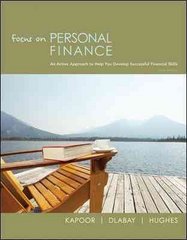Question
Next, he assembled the following data. Long-term Debt Southeasterns long-term debt consists of 7.5 percent coupon, BBB-rated, semiannual payment bonds with 15 years remaining to
Next, he assembled the following data.
Long-term Debt
- Southeasterns long-term debt consists of 7.5 percent coupon, BBB-rated, semiannual payment bonds with 15 years remaining to maturity. The bonds recently traded at a price of $956.31 per $1,000 par value bond. The bonds are callable in five years at par value plus a call premium of $50, for a total of $1,050.
- The founders have an aversion to short-term debt, so such debt is used only to fund cyclical working capital needs. Southeasterns financial plan calls for the issue of 30-year bonds to meet long-term debt needs.
Equity
- Southeasterns last dividend (D0) was $0.17, and its common stock now sells at a price of $5.25 per share. The company has 10 million common shares outstanding.
- In the past few years, Southeastern has averaged a 20 percent return on equity and has paid out about 50 percent of its net income as dividends.
- Southeasterns historical beta, as measured by several analysts who follow the stock, falls in the range of 1.3 to 1.5.
Capital Structure
- Southeasterns federal-plus-state tax rate is 40 percent.
- Southeasterns target capital structure includes weights of 35 percent long-term debt and 65 percent common stock
Operating Divisions
- About 60 percent of Southeasterns operating assets are used by the Healthcare Services division, and 40 percent by the Information Systems division. Managements best estimate of the Healthcare Services divisions beta is 1.0.
Following are the two divisions investment opportunities for next year:
Healthcare Services Division Estimated internal rate of return
A new office in Naples 9.3%
A new office in Sarasota 9.8%
Information Systems Division Estimated internal rate of return
A new healthcare record system 12.2%
Expanded billing software 13.2%
Clark has hired you as a consultant to develop Southeasterns overall corporate cost of capital. You will have to meet with the financial VPand possibly with the president and the full board of directors (including the founders and the finance professor)to present your findings and answer any questions.
EXHIBIT 17.1 Southeastern Homecare: 2017 Financial Statement Extracts (in Millions of Dollars)
Balance Sheet
Cash and marketable securities $ $2.5 Accounts payable $ $1.1
Accounts receivable 5.9 Accruals 1.0
Inventory 1.3 Notes payable 0.2
Current assets $9.7 Current liabilities $2.3
Net fixed assets 41.9 Long-term debt 20.0
Common stock 29.3
Total assets $51.6 Total liabilities $51.6
Income Statement
Net revenues $80.6
Cash expenses 71.8
Depreciation 2.8
Taxable income $6.0
Taxes 2.4
Net income $3.6
Dividends 1.8
Additions to retained earnings $1.8
Exhibit 17.2 Selected Market Data
Expected Rate of Return on the Market
Expected rate of return on the S&P 500 Index = 11.0%
Required Rate of Return on Long-Term Debt of an Average Company
Yield to maturity on A-rated long-term debt for a company with a beta of 1.0 = 7.0%
Current Yield Curve on US Treasury Securities
Term to Maturity Yield
3 months 2.5%
6 months 3.0
9 months 3.3
1 year 3.5
5 years 4.0
10 years 4.5
15 years 4.8
20 years 5.0
25 years 5.1
30 years 5.2
Exhibit 17.3 Selected Not-for-Profit Hospital Data
Average Long-Term Capital Structure
30 percent debt
70 percent equity (net assets)
Average Cost of Debt
Interest rate on A-rated tax-exempt bonds = 5.0%
Question:
- How to calculate:
- Beta Coefficient
- Risk-free rate
- Required market return
- Constant growth rate
- Risk Premium
Step by Step Solution
There are 3 Steps involved in it
Step: 1

Get Instant Access to Expert-Tailored Solutions
See step-by-step solutions with expert insights and AI powered tools for academic success
Step: 2

Step: 3

Ace Your Homework with AI
Get the answers you need in no time with our AI-driven, step-by-step assistance
Get Started


